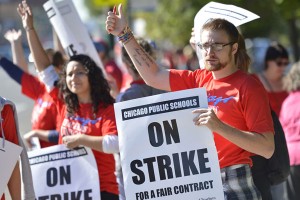In Recognition Of The Chicago Teachers Union Strike
Chicago teachers have the highest average salary of any city at $76,000 a year before benefits. The average family in the city only earns $47,000 a year. Yet the teachers rejected a 16 percent salary increase over four years at a time when most families are not getting any raises or are looking for work.
Chicago Public School already teachers enjoy the highest average pay of any district in the nation—$76,000 a year, plus benefits. (The CTU argues it is only $71,000 after taking out contributions for their pensions and health care.) The union wanted a 30 percent raise but has indicated it could settle for the 16 percent the city is now offering (raising average annual pay to $88,000).
Teachers pay only 3 percent of their health-care costs and out of every new dollar set aside for public education in Illinois in the last five years, a full 71 cents has gone to teacher retirement costs.
Monday morning, teachers showed up in force on picket lines as parents dropped their children off at 144 contingency elementary and high schools across the city, as well as at parks, libraries and YMCAs. (Daycare paid for by taxpayers anyone?)
Even as a chemistry teacher in Chicago Public Schools, Karen Lewis made her students work hard to find answers, according to one of her former principals. In 2010, Lewis defeated Marilyn Stewart, vaulting from the rank and file to union president. Teachers union officials declined to provide information on Lewis’ salary. But Stewart made $211,119 in 2009, her final full year in office. Lewis took over as president for part of 2010, and was paid $71,330 by the teachers union that year, records indicate. Lewis also is eligible for compensation from the Illinois Federation of Teachers, and in 2011 she was paid $64,157 by that group, records indicate.
The union has a great deal of leverage in its strike. It can prevent more than 350,000 children from receiving an education. It has forced parents to find other ways of caring for their kids while they work. Many children will wander the streets—police are beefing up patrols to forestall trouble.
The union prefers having children pay this price to letting the district fire bad teachers. This is not exactly surprising. Unions serve their members’ interests first. No union would sacrifice its members’ job security to spare parents from a strike.
This is why collective bargaining does not belong in government—and why more states should emulate Governor Scott Walker’s (R–WI) reforms. No competitors exist to pick up the government’s slack. Unlike in the private sector, a government strike shuts down vital services entirely. The government exists to serve the common good, but unions exist to serve themselves. They should not have the power to shut down the government to get their way.
Since their own services have to do with the functioning of the Government, a strike of public employees manifests nothing less than an intent on their part to prevent or obstruct the operations of Government until their demands are satisfied. Such action, looking toward the paralysis of Government by those who have sworn to support it, is unthinkable and intolerable.